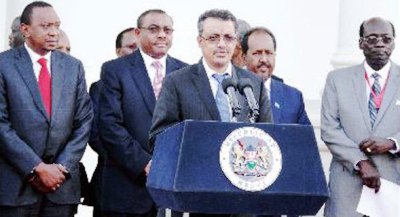IGAD leaders may seek UN sanctions against S. Sudan rival leaders: opponent
June 25, 2014 (JUBA) – The Inter-Governmental Authority on Development (IGAD), the regional bloc mediating South Sudan peace talks aimed at ending the more than six-month-old conflict, may seek approval from the United Nations Security Council (UNSC) to impose sanctions on the main SPLM rival factions to the conflict.

The former detained SPLM leader said that “issues like the inclusivity can be raised as talks continue. Also the demand limiting the talk to the two parties contravene the two agreements, the May and the June agreements which provides participation of the other stakeholders in the roundtable negotiation”.
Jok said he and his group had a meeting Wednesday with the head of the IGAD mediation committee, Seyoum Mesfin, to register their readiness to participate in the talk as per the June agreement without any condition.
He revealed that the head of the mediation team will travel to New York in coming days to submit a report to the UNSC on the progress of the negotiations.
“We had a good meeting with the mediation team to clarify our position. We told them our readiness to participate in the talks without any condition in accordance with the May and June agreements. We stressed to them the need to expedite the peace process so that it ends the suffering of our people,” Jok said.
Last Monday the mediators announced the indefinite adjournment of the peace talks following the boycott of the talks by SPLM/A In Opposition; to protest the exclusion of civil society organisations and faith-based groups who fled the country. They also said the selected groups are dominated by the pro-government societies.
But the mediation slammed the move and decided to postpone the talks.
“This is in contradiction to the 9 May 2014 agreement, as well as the 10 June 2014 communiqué, which provides for the inclusion and participation of other stakeholders in the negotiations for a new political dispensation in South Sudan,” said the mediation team on 23 June.
The mediators also explicitly stated that they would undertake consultations with the African Union and the UNSC and other friends and partners of South Sudan.
The mediation earlier this month gave a deadline of 60 days to the parties to finalise talks on the formation of a transitional government, or else face penalties for impeding the peace process.
Jok underlined there is a high possibility that sanctions will be imposed on parties to the conflict, depending on the recommendation of the mediators.
According to the former justice minister, the imposition of sanctions will depend on the report to be submitted by the chief mediator Seyoum Mesfin to the UNSC.
However, Jok did not express his thoughts on who could be targeted by these sanctions.
On 20 June, the ruling SPLM faction and the group of former detainees threatened to boycott the talks over the representation of the civil society groups. While the SPLM-in Opposition agreed to resume discussions, saying they have similar reservations.
However, it later appeared that the two camps changed their positions and it appeared the talks were boycotted by the faction of Riek Machar.
The former minister is one of the former political detainees who were held in Juba for more than a month over accusations of taking part in an alleged coup d’état against president Salva Kiir.
Last month the United States unilaterally imposed asset freezes against the commander of Kiir’s presidential guard, Marial Chanuong, and top rebel general Peter Gadet Yaak. The US government stated that it would attempt to seize any of their assets that came under control of its country’s banking system, and it also described the designation of those two leaders as only a “first step”.
In late April and May, French and US diplomats at the UNSC were reported to be considering a resolution to impose sanctions on South Sudanese leaders.
The SPLM in-Opposition criticised as “unnecessary” the decision by IGAD to adjourn the peace talks, saying instead the mediators should have responded to their concerns about the selection process of other stakeholders.
The opposition delegation boycotted the talks last Friday and Saturday over concerns that the non-governmental stakeholders at the talks – clergy, civil society and other political parties – were not representative of the country overall.
After the suspension of the talks on Monday, the deputy spokesman of SPLM-IO Mabior Garang de Mabior accused the IGAD of “backtracking” from the agreed agenda and framework for the talks. He said the opposition “fears that the mediation undermined inclusivity by presenting government-sponsored institutions as credible South Sudanese civil society organisations”.
(ST)
